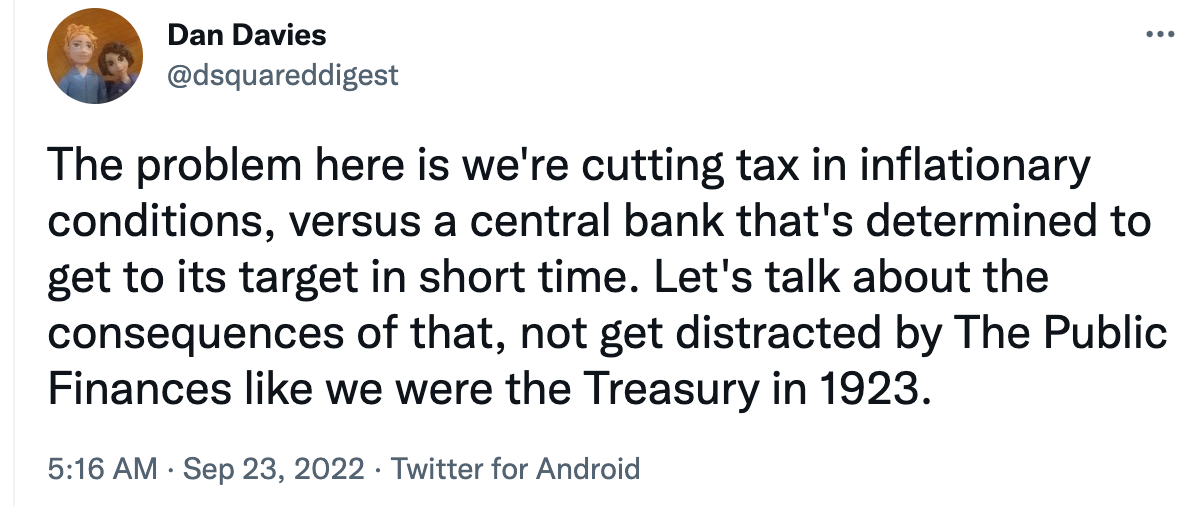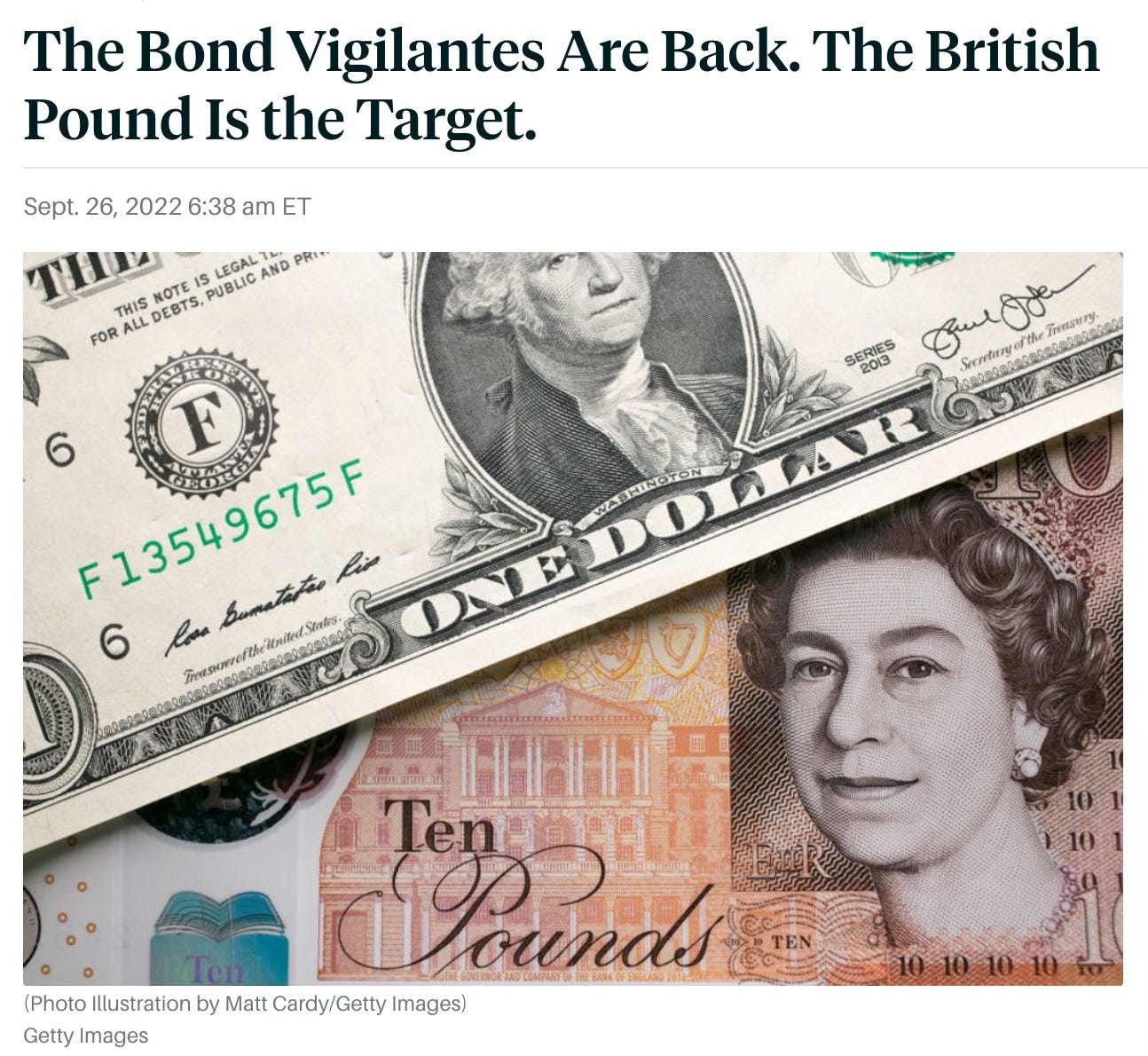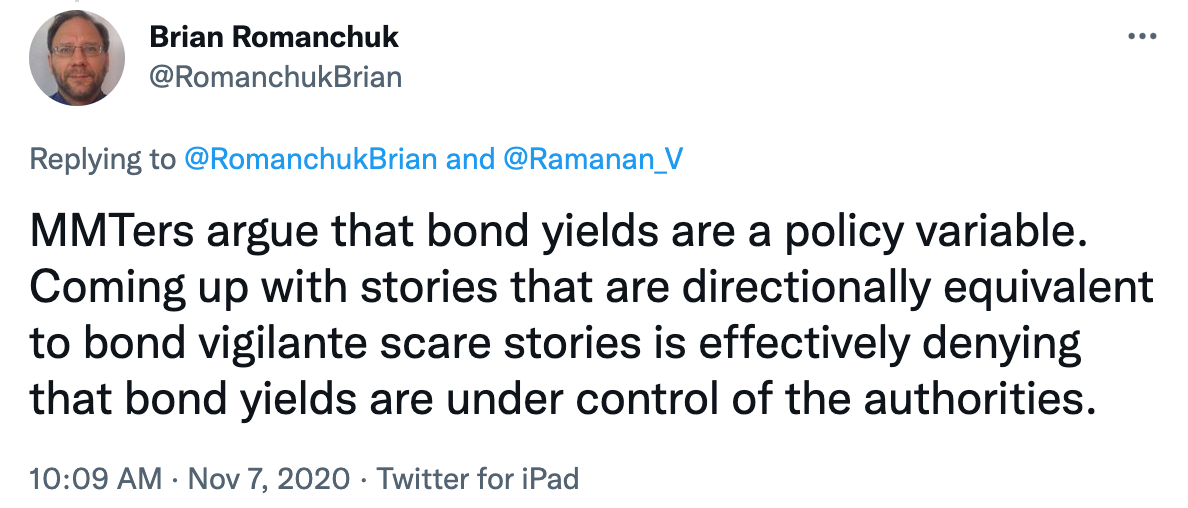Did the Bond Vigilantes Give Thumbs-Down to Truss and Kwarteng's Budget?
I’ve been thinking about the events that unfolded after British Prime Minister Liz Truss and her chancellor, Kwasi Kwarteng, released their so-called “mini budget.” It seems that almost everyone has embraced some version of this explanation:
Truss/Kwarteng: “Behold, our economic plan!”
Financial Markets: “Yeah, no.”
The government wanted to do something irresponsible and financial markets expressed their disapproval, ditching the British currency and gilt-edged bonds. As both domestic and overseas investors must cough up the sterling to “finance” the largesse, they can effectively tell the government to pound sand by closing ranks and refusing to go along for the ride.
It’s certainly a convenient argument, especially for those who really hate the plan. And for the record, I’m no fan. Here’s what I wrote the day the “mini-budget” was released. I didn’t like it, but I also didn’t like the emerging narrative, which is why I ended my post by featuring this tweet.
I didn’t like the “mini-budget” for the same reasons I didn’t like the massive tax cuts that republicans pushed through in December 2017. While Larry Summers was complaining (wrongly) that the Trump tax cuts would mean that “our country will be living on a shoestring for decades because of the increases in the deficit that will result,” here’s what I was saying:
Are the proposed tax cuts a huge giveaway to the rich? Most definitely. Will they, as advertised, create a booming economy with benefits that trickle down to everyone else? I don’t think so. Mr. Trump’s plan will widen the country’s already dangerous wealth and income gaps, and because the gains go mostly to those at the very top, the tax cuts won’t do much to promote broad-based consumer spending or overall job growth.
That’s enough to reject the plan. But it would be unwise to oppose tax cuts, or any other federal legislation, simply because they add to the deficit.
Why? Because bigger deficits wouldn’t wreck the nation’s finances.
You might argue that the US was able to roll those huge tax cuts onto the deficit without any problem because the US dollar is the global reserve currency or because inflation was super low at the time. And while both of those things are true, it’s also true that people had been hollering about a looming fiscal crisis for years, the Great Recession added trillions to the “national debt”, the Federal Reserve was raising interest rates at the time, and people like Paul Krugman were telling us that republicans were going to “blow up deficits at a time when they will do harm.” Yet there was no market meltdown.
I guess my point is that it’s not always easy to tell a coherent story about financial market gyrations in real time. Investors don’t want to lose money. They place bets, continuously reassess positions, adjust portfolios, panic or exuberantly trade with the herd, and sometimes face forced liquidations.
It’s easy to point to the release of the mini-budget and the subsequent market selloff and say, “This is a clear rebuke of the government’s ‘unfunded’ tax cuts and spending plans!” But was it the “unfunded” bit that led investors to dump gilt-edged bonds? Did markets panic at the prospect of adding to the deficit and pushing the debt/GDP ratio higher? Or did they move out of sterling-denominated assets because they feared the inflationary effects of the package? Or, is this pretty much what you’d expect when a lot of people start insisting that the Bank of England must counteract the “stimulus” with an aggressive “emergency rate hike”?
Investors obviously think about the impacts of macro policy. They think about growth prospects and what their money will get them, in real terms, at some future date. And those considerations influence their willingness to buy and hold all sorts of financial instruments, including government bonds and foreign exchange. But I’m skeptical of arguments that claim that the recent market turmoil can be explained by investors—bond vigilantes—giving a thumbs-down to “fiscal profligacy” or whatever.
I think this is just wrong.
For a currency-issuing government with floating exchange rates that doesn’t borrow in foreign currency, interest rates on government liabilities (reserves or government bonds) are a policy variable (whether the government chooses to exercise loose or tight hold over them).
With the Labour Party surging in recent polls, there are reports that some Conservative MPs are urging party leaders to “restore market confidence” by jettisoning the politically-toxic tax cuts. So far, Kwarteng says the government has “no choice” but to stick to the plan.
Of course they have a choice.
And so will the British people when the time comes. Right now, all signs point to a big thumbs-down—or perhaps a big finger up—from voters. And that’s the disciplining force the Tories should actually worry about.





And notice that since the intervention of the Bank of England the pound has recovered to the levels pertaining before Kwarteng's statement. So much for the "bond vigilantes".
Very often when you see divergences developing between price action and news flow (which remains unremittingly negative), that often signals a major turning point. Like Stephanie, I think the Truss/Kwarteng package is awful, not because it will "bankrupt" the UK, more because the government is deploying its fiscal freedom is a profoundly wrong-headed manner.
Having read the deficit myth and several of your interview pieces I don’t feel completely a beginner with MMT. I would like to know what the effect of the Bank of England buying bonds is. As far as I can see this means that the balance sheet of the bank expands also that less of the deficit is funded and the amount of interest paid by the government will be reduced since some of it is being paid to itself. If we take this to the limit none of the deficit would be funded there would be no interest to pay. How would the famous intimidating bond markets react? Please forgive if this is a stupid question (though I have heard that there are no stupid questions).